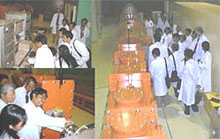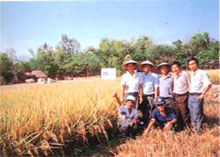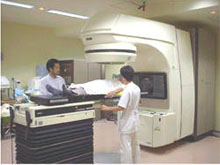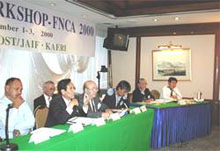| Seven
Fields |
|
| 1. |
Utilization
of Research Reactor |
|
| a. |
|
The
Small Angle Neutron Scattering (SANS) project was supported
to study thermoplastic elastomers derived from natural
rubber and one or two other polymers in connection
with properties starting in 2001. The next meeting
of the project leaders will be held in 2004. |
|
| b. |
|
The
Nuclear Activation Analysis (NAA) project proposal
should be reviewed to be more complementary with the
RCA environmental project by accommodating RCA results
as much as possible. The NAA project should focus on
(a) establishment of Ko method as a useful analytical
tool for a large number of environmental samples and
(b) strengthening the linkages with the national authorities
for environmental policy, and (c) encouraging installation
of a suitable number of monitoring stations for application
of Ko method in the future. |
|
| c. |
|
The
Tc-99m generator project proposal was supported by
most of the FNCA countries including China, Indonesia,
ROK, Malaysia, the Philippines, Thailand, and Vietnam. |
|
| d. |
|
Some
countries expressed reservation on the Boron Neutron
Capture Therapy (BNCT) proposal by China because the
technology has not been proven as an effective method
for treatment of brain cancer and skin cancer. The
FNCA may be able to hold one small workshop to collect
most up-dated information on BNCT involving appropriate
experts. The FNCA participants should be limited only
from countries which have reactors which can be used
for BNCT now or in near future. |
|
|
| 2. |
Application
of Radioisotopes and Radiation for Agriculture |
|
| a. |
|
Mutation
breeding of rice and sorghum is strongly supported
as priority items for future activities, noting the
program on rice will complement with RCA project. Technical
details including project formulation should be discussed
at the next workshop. |
|
| b. |
|
Most
countries support the biofertilizer project provided
that it should be complementary with the RCA Project
on biofertilizer terminated in 1995. In this regard
emphasis will be on the selection of appropriate Rhizobium
spp focusing on extensive use of biofertilizer not
only for grain legumes but also for forage legumes,
rice plant, cover crop for plantation, etc., recognizing
its environmental and economic benefits, nuclear techniques
should be the key technical component. According to
the IAEA report, Thailand is only country using the
biofertilizer extensively among the FNCA countries.
At the first project meeting, the current status of
application of biofertilizer should be reported by
participating countries for further discussion and
project scoping. |
|
|
| 3. |
Application
of Radioisotopes and Radiation for Medical Use |
|
| a. |
|
The
project on radiation therapy of uterine cancer should
be continued as proposed and further disseminate the
present protocol. |
|
| b. |
|
Radioimmunodetection
and therapy projects were proposed by China and the
Philippines. For the next workshop all nuclear medicine
practices for liver and breast cancer treatment and
diagnosis should be discussed. |
|
|
| 4. |
Public
Information of Nuclear Energy |
|
| a. |
|
The
FNCA countries are encouraged to share their strategy
of national public information program together with
suggestions of how they will measure success. The Project
Leader Meeting should define specific program to be
supported by the FNCA to meet with their specific national
needs. |
|
| b. |
|
It
was also suggested that Project Leader Meeting should
have one or two specific topics to be discussed, for
example, training in methodology to survey public opinion
for public information officers in requested countries. |
|
| c. |
|
It
is also necessary to identify factors that affect the
effectiveness of nuclear-related public information
in different culture contexts. |
|
|
| 5. |
Radioactive
Waste Management |
|
| a. |
|
The
project proposal on enhancement of safer management
of spent radiation sources is supported, noting there
should be close communication with RCA and other IAEA
activities. The Philippines and Thailand will be voluntary
countries. |
|
| b. |
|
The
proposal for a consolidated report on radioactive waste
management is also supported. |
|
|
| 6. |
Nuclear
Safety Culture |
|
| a. |
|
This
project is strongly supported and continued with an
active participation of all the FNCA countries. |
|
| b. |
|
The
meeting encouraged the Coordinators to urge their national
authorities (a) to sign or ratify “Nuclear Safety Convention”
and (b) to give strong support to the national plan
on safety culture practices. |
|
|
| 7. |
Human
Resources Development |
|
| a. |
|
Comments
were made to focus the activities on the human resources
development strategy for enhancement of nuclear safety
in particular radiation safety and waste management
safety. |
|
| b. |
|
Many
interventions were made on the proposal of Asian Institute
of Nuclear Science and Technology (AINST) proposed
by Indonesia. However, a feasibility study on this
concept was generally supported to define several possible
options including utilization of existing centers of
excellence. |
|
| |
|
|
 |
|
 |
| Utilization
of Research Reactor at BATAN, in Indonesia |
|
Mutation
Breeding of Rice on Application of Radioisotopes and
Rasiation for Agriculture in Vietnam |
| |
|
|
 |
|
 |
| Radiation
Therapy at the National Institute of Radiological Science
in Japan (include therapy of cervical Cancer) |
|
Discussion
with Mass Media include Mr. Lee, the former Science
Editor of Dong-A Daily Newspaper at Public Information
Workshop in Korea |
| |
|
|
|
| New
Activities |
|
| 1. |
Nuclear
Energy and Sustainable Development
This project is proposed by Indonesia and supported by several countries
including the Philippines, Thailand and Vietnam. Importance of this
project is well recognized by the meeting. However, the specific
activities of the proposal should be more clearly defined including
work plan to be complementary with extensive IAEA activities on comparative
study of nuclear power. Indonesia will elaborate with an additional
paper to specify activities and work plan as soon as possible, to
be circulated to the FNCA countries. This proposal, then will further
be discussed at the Second FNCA Meeting. |
|
|
| 2. |
Utilization
of Electron Beam Machine
This project proposed from Japan and Vietnam is supported by most
of FNCA countries. Vietnam is not in a position to install accelerator
due to funding difficulty. Workshop for demonstration technology
can be held in Japan using existing facility. A suggestion was made
that the EB system in Japan could be made available as a demonstration
plant in FNCA countries on loan basis. It is also proposed to design
and assemble a low cost EB system from component parts in FNCA countries
to minimize cost using their expertise among the FNCA countries. |
|
|
| 3. |
Nuclear
Technique and Sustainable Development of Environment
This project proposal by China covers broad activities. However,
China proposed that this project could be performed through the development
and utilization of new biofertilizer, like that proposed by Japan
and Vietnam, which contributes to protection of soil degradation. |
|
